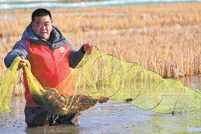MIGRANT WORKERS BAND TOGETHER
A Beijing community finds solace in artistic endeavors, Fang Aiqing reports.

There's no lack of dreams and passion in Picun village, a migrant workers' community 30 kilometers northeast of the bustling center of Beijing, beyond the repetition of day-to-day life.
A group of people from the grassroots of society are trying hard to enrich the lives of both themselves and their neighbors because, as resident Fan Yusu once put it, there should be something other than earning bread to satisfy one's spirit.
Previously in 2017, Fan, 44-year-old then, a babysitter working in a brownstone area, rose to fame with her writing on domestic social media platforms.
"My life is an unbearable book, destiny has bound it awkwardly."
The middle-aged woman, not properly educated, divorced to escape domestic violence and has two daughters to bring up on her own. She started her memoir, in which she recounts her childhood in a village of Xiangyang, Hubei province, experiences of her own family and the one she's been working for, and life in Picun.
Fan's popularity illuminated other budding writers in the community to the possibilities therein. They even had college professors volunteer to give lessons on writing and discuss literature with them.
One of those who is gradually winning fans by following in Fan's footsteps is Hu Liushuai. Writing under the nickname of Xiaohai, he worked in factory from the age of 15 until he was 28 years old. He used to create poetry beside factory assembly lines, in revolt against the monotony and uncertainty of his career.
Born to a farmer's family in Central China's Henan province in 1987, he'd been working in factories, assembling radios or operating sewing machines, among other things, in Shenzhen and Guangzhou in Guangdong province, Suzhou and Nanjing in Jiangsu province and Shanghai for 13 years before arriving in Picun.
To kill time, he would try to recite hundreds of poems from the Tang (618-907) and Song (960-1279) dynasties, or glance over Chinese dictionaries. Later he tried to write modern poems, learning to honestly face up to and lay down his loneliness and achieve comfort from the process.
Tired of factory life, he's been living in Picun since 2016, and works for a nonprofit clothing store in the community, selling relatively cheap, secondhand clothes to migrant workers.
Instruments of change
Dreaming of becoming a rock star, Hu keeps creating lyrics and humming to himself, sometimes by the nearby Wenyu River. He has managed to sing for his neighbors and children around the community.
For the first time, he performed an original song called I Have Never Found Myself publicly at Apple's retail outlet in the Sanlitun shopping area of the capital on Oct 12, during the closing ceremony of a Today at Apple Creative Studios program.
The 12-week program, jointly initiated by Beijing-based China Foundation for Poverty Alleviation and YouChange China Social Entrepreneur Foundation, is one where young people, especially migrant workers, can take lessons to learn and improve their artistic and technological skills.
"I've passed through the crowd, in endless silence.
I've walked along the busy street, with winds howling beside.
I've tried thousands of ways to survive, nobody knows.
I've found the hidden sun.
I've discovered the lonely moon.
I'm just not able to have myself found, wandering like a dandelion."
The lyrics were written in 2015, when Hu felt he was trapped in the workshop of a Suzhou factory. His friend Xie Hangcheng, a music teacher for the community, helped Hu with arrangement and accompanied him on guitar, while another friend Chen Wei, who is visually impaired, played the drums.
Their mentor for the program, Shi Lu, iconic female drummer of rock band Hedgehog, while speaking highly of the lyrics abstracted from Hu's life experiences and the well-organized arrangement, pointed out to them that there's a long way to go before turning one's creativity and ambition into an accomplished, beloved piece of work.
Over the past three months, Hu practiced a lot, especially to follow the beat, but it still proved challenging. Yet, it was the time spent together creating and practicing that they enjoyed the most. They set up a new band along with a few others to try and spark some flames of inspiration.
Shi also shared with them ideas about how to run a band, coordinate with other partners and solve inevitable internal frictions, and how to extract life details and turn the inspiration into melody, says Wang Bo, another member.
Xie, who is an albino, and Chen are members of the band 8772, made up of seven young musicians who all deal with physical challenges, such as brittle bone disease and spinal muscular atrophy.
With the program, the band improved their skills in applying soundtrack recordings, rhythm sequencers and other techniques, while polishing arrangements of their songs created over the past six years and learned the basics of music video production.
They also got the opportunity to visit Taihe Music Group, a major Chinese record label, to gain a deeper understanding of how the music industry works.
Inspiring idea
Wang Qian is a librarian in the community, who recently spent a lot of time and effort trying to create a phone application that enables readers to search for lists of books not only found at the charity library, but also those of people who want to open their personal libraries to their neighbors.
The idea drifted into her mind when a teenage boy came with his mother looking for Japanese writer Keigo Higashino's best-selling Miracles of the Namiya General Store but failed to find a copy. When Wang was adding it to the purchase catalog, someone overheard the dialogue and offered to lend her personal copy of the book to the boy and brought it to the library the next day.
The teenage boy finished the book several days later with a letter written to Namiya, the owner of the store in the novel, who claims to be able to relieve anxiety and give consolation. In the letter, the boy expresses his confusion, one that might be residing in minds of many who live in Picun: how to define a "happy life"?
Seeing the impact of this "transaction", Wang was determined to make up for the information gap via a phone app, which will improve the reuse of books and help local bookworms to get acquainted.
With the help of several frequent library visitors, she summarized potential functions of the app, based on several rounds of street surveys she conducted personally, and immersed herself in its design. Feeling that there is so much that can be done in her surroundings, from book lending and retrieval to attracting more neighbors-both adults and children-into reading and encouraging them to share knowledge and feelings offline, she had plenty of inspiration.
Experiencing passion, self-doubt and going back to the drawing board more than once to start all over again and rebuild confidence, she expects to optimize the design, realize it and gradually extend its functions.
Everyone can be a creative individual that has something to contribute, she concludes.
Wang Bo says by gathering together and striving with people for the same hobby, such as rock music, they've got new ideas, support and supervision to pursue an improvement in their fortunes, both spiritual and material.
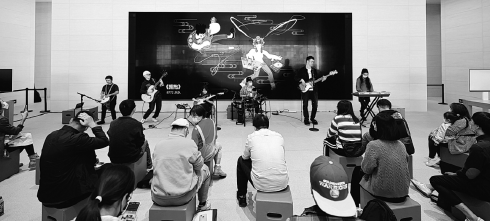
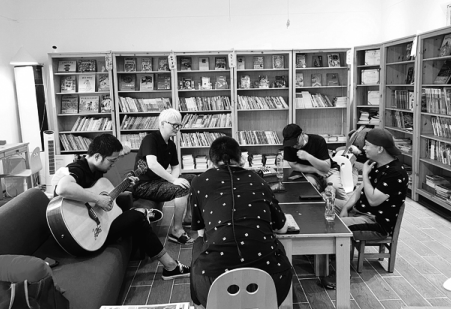
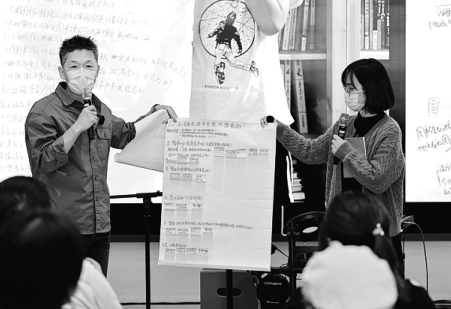
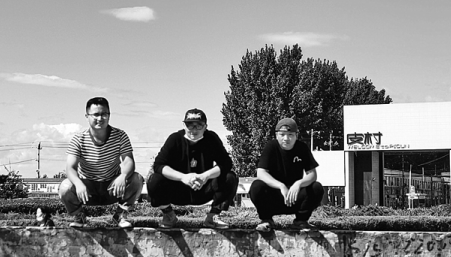
Today's Top News
- China to apply lower import tariff rates to unleash market potential
- China proves to be active and reliable mediator
- Three-party talks help to restore peace
- Huangyan coral reefs healthy, says report
- PLA conducts major drill near Taiwan
- Washington should realize its interference in Taiwan question is a recipe it won't want to eat: China Daily editorial























